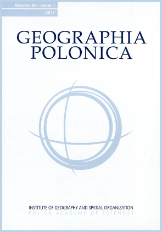- Tytuł:
-
Geographia Polonica Vol. 90 No. 2 (2017)
Social segregation and spatial differentiation of electoralalignment in Vilnius metropolitan area - Autorzy:
-
Ubarevičienė, Rūta
Baranauskaitė, Aušra
Burneika, Donatas - Słowa kluczowe:
-
metropolitan area
electoral segregation
electoral differentiation
zróznicowanie wyborcze
social segregation
segregacja wyborcza
segregacja społeczna
miasto postkomunistyczne
zróżnicowanie rezydencjalne
residential differentiation
Wilno
obszar metropolitalny
Vilnius
post-communist city - Data publikacji:
- 2017
- Wydawca:
- IGiPZ PAN
- Język:
- angielski
- Linki:
- https://rcin.org.pl/dlibra/publication/edition/62831/content Link otwiera się w nowym oknie
- Prawa:
-
Licencja Creative Commons Uznanie autorstwa-Na tych samych warunkach 3.0 Polska
Creative Commons Attribution BY-SA 3.0 PL license - Źródło:
-
http://195.187.71.2/ipac20/ipac.jsp?profile=geogpan&index=BOCLC&term=ee95400564
CBGiOS. IGiPZ PAN, sygn.: Cz.2085, Cz.2173, Cz.2406
CBGiOS. IGiPZ PAN, call nos.: Cz.2085, Cz.2173, Cz.2406 - Dostawca treści:
- RCIN - Repozytorium Cyfrowe Instytutów Naukowych
- Książka
Menu główne
Wyszukiwarka
Treść główna
